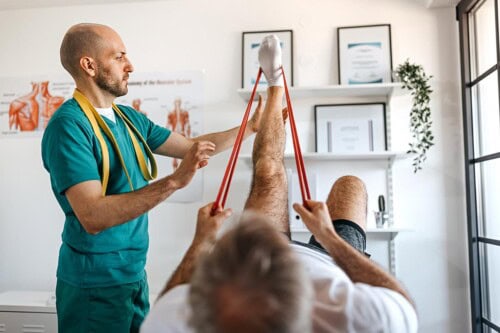Physical therapy is a rewarding profession, but it comes with its own set of challenges. Long hours, physical strain, and emotional exhaustion can lead many to search for a good career change for a physical therapist. If you’re thinking about making a change, you may wonder what careers best leverage your skills and experience while offering better work-life balance and new growth opportunities.
Let’s explore some of the best career changes for physical therapists and how to transition successfully.
Why Physical Therapists Consider Career Changes
Between 2021 and 2022, over 15,000 physical therapists exited the profession, accounting for an 11% reduction in the workforce, according to data published by the Alliance for Physical Therapy Quality and Innovation. Additionally, a 2023 report highlighted that outpatient physical therapy practices are experiencing significant staffing shortages, with vacancy rates averaging 10% in mid-2023.
These figures suggest a continuing challenge in retaining physical therapy professionals. Many physical therapists find themselves exploring new career options for the following reasons:
Burnout and stress
The physical demands of working with patients daily, combined with administrative tasks and insurance-related issues, can be exhausting. Over time, this stress can lead to burnout.
Debt
According to an American Physical Therapy Association report, nearly 93% of recent physical therapist graduates carry debt, at an average of $152,882 for all debt except mortgages. For 90% of these PTs, that amount includes considerable outstanding balances in education-related loans; the average amount is $142,489. Broken out even further, for 89% of PTs with education debt, most of that amount (80%) is attributed to loans for their PT education, the average balance being $116,183.
Overwhelming debt leads some physical therapists to pursue more lucrative positions or industries.
Desire for a better work-life balance
Physical therapists often work long hours, including evenings and weekends, to accommodate patients’ schedules. This schedule can make it challenging to prioritize personal time and family commitments.
Physical strain
The job requires significant physical activity, including lifting and assisting patients with mobility exercises. Over time, this can take a toll on the body, leading some therapists to seek less physically demanding careers.
Emotional exhaustion
Building relationships with patients is rewarding, but it can also be emotionally draining, especially when working with individuals recovering from severe injuries or chronic conditions.
Seeking new challenges and growth opportunities
Some physical therapists feel they have reached a plateau in their careers and want to explore new challenges, whether in a related field or something entirely different.
Transferable Skills from Physical Therapy
Physical therapists possess a wide range of skills that can be applied to various careers. These include the following:
- Communication Skills – Physical therapists explain complex medical concepts to patients. These skills translate well into sales, consulting, and education roles.
- Problem-Solving Abilities – PTs assess patient needs and develop treatment plans. These skills align with roles in consulting and healthcare administration.
- Attention to Detail – PTs ensure patients follow their treatment plans correctly, which can be useful in technical and analytical careers.
- Time Management – Managing multiple patients and administrative tasks prepares physical therapists for roles requiring organization and efficiency.
- Empathy and Emotional Intelligence – The ability to connect with patients and understand their challenges is invaluable in any people-centered career.
- Networking and Relationship Building – Establishing professional relationships with patients, caregivers, and healthcare providers translates well to sales and real estate roles.
Top Career Change Options for Physical Therapists
What are the best jobs for a physical therapist ready to change careers? Here are some of the most common career change options for PTs within and outside the healthcare industry.
1. Real Estate Agent

Average Income: $100,033 (Indeed, February 2025)
Why Real Estate is a Good Fit for Physical Therapists:
Real estate offers flexibility, unlimited income potential, and the opportunity to help people make important life decisions. Physical therapists already have strong interpersonal and problem-solving skills, making them well-suited for this profession.
Transferable Skills That Apply
- Communication and relationship-building skills to assist clients
- Attention to detail in contracts and negotiations
- Time management for balancing multiple clients and listings
Steps to Become a Real Estate Agent
- Complete a state-approved pre-licensing course
- Pass the real estate licensing exam
- Join a brokerage and gain industry experience
- Build a client base and network within the community
2. Medical Sales Representative

Average Income: $78,160 (Indeed, February 2025)
Overview of the Role:
Medical sales representatives promote and sell medical equipment or pharmaceuticals to healthcare providers. The role involves building relationships, demonstrating product benefits, and closing sales.
Skills Physical Therapists Bring to the Position:
- Deep understanding of medical terminology and patient care
- Strong communication and presentation skills
- Ability to build trust and relationships with healthcare professionals
How to Transition into Medical Sales:
- Gain sales experience through networking or training programs
- Obtain relevant certifications such as the Certified Sales Professional (CSP)
- Apply for entry-level sales positions in medical or pharmaceutical industries
3. Healthcare Consultant

Average Income: $82,993 (Indeed, February 2025)
Description of the Job:
Healthcare consultants work with medical facilities to improve efficiency, implement best practices, and ensure regulatory compliance. This role involves problem-solving and strategic planning.
Benefits for Physical Therapists:
- Use healthcare expertise to improve patient care on a broader scale
- Less physically demanding compared to clinical roles
- Opportunities to work with different healthcare organizations
Necessary Qualifications and Steps to Transition:
- Earn a certification in healthcare management or consulting
- Gain experience in administration or management
- Network with professionals in the industry
4. Medical Writer

Average Income: $96,462 (Indeed, February 2025)
What Medical Writing Entails:
Medical writers produce content such as research papers, educational materials, and regulatory documents for healthcare organizations, pharmaceutical companies, and academic institutions.
Skills Physical Therapists Can Leverage:
- Strong understanding of medical terminology and treatments
- Ability to simplify complex information for different audiences
- Attention to detail for accurate and clear writing
How to Start a Career in Medical Writing:
- Take courses in medical writing or journalism
- Build a portfolio of writing samples
- Apply for freelance or full-time medical writing roles
Education and Training Roles (Professor)

Average Income: $96,983 (Indeed, February 2025)
Opportunities in Teaching and Training:
Many physical therapists transition into roles where they train future healthcare professionals or educate patients about health and wellness.
Why It’s a Natural Fit for Physical Therapists:
- Experience in teaching patients and caregivers
- Strong communication and mentoring skills
- Passion for helping others learn and grow
Pathway to Becoming an Educator or Trainer:
- Obtain additional certifications in teaching or training
- Apply for positions at universities, community colleges, or corporate training programs
How to Make a Successful Career Transition
Making a career change requires careful planning and preparation. Here’s how to do it effectively:
Step 1: Research and plan
Explore various career options, consider salary expectations, and understand the job market before making a move. Speak with professionals in your target field and take online assessments to help identify your strengths and interests.
Step 2: Build a network
Connect with professionals in your desired industry through LinkedIn, career fairs, and networking events. Join industry groups and attend seminars or conferences to gain insights and make valuable connections.
Step 3: Gain additional qualifications or training
Some career transitions may require further education or certifications, so identify the necessary requirements in advance. Consider enrolling in short courses, online programs, or certification classes to bridge any skill gaps.
Step 4: Seek mentorship and guidance
Find a mentor who has successfully transitioned into a new career and learn from their experience. A mentor can provide valuable advice, introduce you to industry contacts, and help you navigate the challenges of switching fields.
Step 5: Stay patient and resilient
Career transitions take time. Stay focused, keep learning, and adapt to new challenges. Set realistic goals and celebrate small milestones to keep yourself motivated throughout the transition.
Switching careers as a physical therapist may seem daunting, but with the right strategy, it’s entirely possible to find a role that offers greater fulfillment, flexibility, and professional growth. Whether you choose real estate, medical sales, consulting, writing, or education, your existing skills will serve as valuable assets in your next career move.






